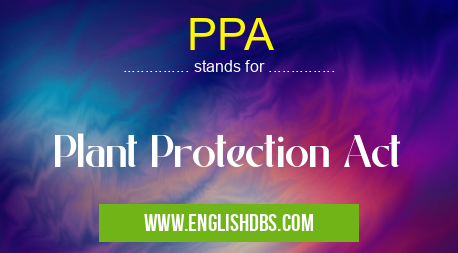What does PPA mean in UNCLASSIFIED
The Plant Protection Act (PPA) is a federal law that was enacted to protect plants from insect pests, diseases, and other plant health risks. The PPA provides the legal framework for managing plant protection issues in the United States and its territories. It also forms the basis for regulating agricultural commodities imports and exports, authorizing inspections and quarantine regulations, regulating pesticide use, funding state cooperative programs, providing grants for research into pest management initiatives, and authorizing emergency measures to prevent or control plant disease outbreaks.

PPA meaning in Unclassified in Miscellaneous
PPA mostly used in an acronym Unclassified in Category Miscellaneous that means Plant Protection Act
Shorthand: PPA,
Full Form: Plant Protection Act
For more information of "Plant Protection Act", see the section below.
Meaning
PPA stands for Plant Protection Act. The purpose of this act is to protect plants from pests, diseases, and other plant health risks by providing legal frameworks for managing them. It also provides regulations on agricultural commodities imports and exports, inspections and quarantine regulations, pesticide use, state cooperative programs, research projects dedicated to preventing or controlling pest outbreaks as well as authorized emergency measures to do so.
Purpose
The main purpose of the PPA is to manage plant protection issues in order to protect plants from pests, diseases and other threats using regulations related to imports/exports of agricultural commodities as well as authorized inspections/quarantines and research initiatives pertaining to pest control/prevention. Additionally the PPA can fund state cooperative programs along with grants used in researching new methods of pest management initiatives. Lastly it authorizes emergency measures when needed in order to prevent or control disease outbreaks of various plants within US territories.
Essential Questions and Answers on Plant Protection Act in "MISCELLANEOUS»UNFILED"
What is the Plant Protection Act?
The Plant Protection Act is a United States law that was passed in 2000 to protect plants and plant products from certain diseases, pests, and other health risks. It authorizes the Secretary of Agriculture to implement regulations to prevent the introduction and spread of harmful exotic plant pests and diseases.
How does the Plant Protection Act protect plants?
The PPA allows for implementing measures such as quarantines on imported plants or plant products, as well as conducting inspections and surveys of plants, their environment, or other related materials. These measures are designed to stop the spread of invasive species or serious threats to crops.
Who enforces the Plant Protection Act?
The Animal and Plant Health Inspection Service (APHIS) is responsible for enforcing the PPA at ports of entry or domestic locations. APHIS ensures that all regulations are met by inspecting shipments, issuing permits/certificates for importation of plant-related material, conducting surveys for potential pest threats, etc.
What kind of information must be provided under PPA?
Any person importing plants into the U.S., must provide documentation from an approved source in order to comply with PPA regulations. This includes information about origins, past destinations for shipment, pests or diseases associated with the product etc.
Are there exemptions under the Plant Protection Act?
Yes, there are exemptions under this act which include but are not limited to medicinal plants intended for research purposes only; live animals; fish including crustaceans; flowers imported from Canada for commercial purposes; some wood products; non-living museum specimens among others provided they don’t pose a threat to agricultural or natural resources in the US.
Is a permit required for transporting plants under PPA?
Yes it is required depending on what is being transported and where it has come from/is going. A permit may be requested by any person who plans on moving plants across state lines either directly or indirectly (e.g through cargo delivery services).
Is there any penalty imposed if I fail to comply with the requirements of Plant Protection Act?
Inability to provide evidence that all necessary regulations have been complied with can lead to civil penalties being imposed or rejection of goods being imported into US territory entirely.
Does Plant Protection Act apply outside US territory?
The rules regarding inspection and quarantine do not apply outside US borders however any product exported may still need permission from APHIS before it leaves US territory if it contains plant material regulated by this act.
Final Words:
In conclusion the Plant Protection Act (PPA) exists as an important regulatory body protecting a variety of plants from insect pests, diseases and other health risks by providing legal frameworks used in effectively managing these issues as well as implementing mandatory inspections/quarantine regulations based on imports/exports of agricultural commodities all while funding valuable state cooperative programs aiding research into safe pest management practices.
PPA also stands for: |
|
| All stands for PPA |
